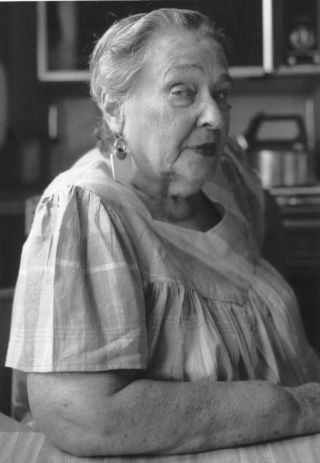Aging
When is Enough, Enough?
Complications arise when a busy daughter has to take care of her aging mother.
Posted December 1, 2014
Your ninety-year-old mother insists on remaining “independent” in her own apartment. She needs you to take her to the doctor, to arrange for extra help following medical procedures, to fill in when there is any kind of gap in her ability to keep afloat with daily life tasks. Sometimes you have to take off from work on short notice because of a crisis here and there, such as a tumble on the living room floor from a transitory but severe episode of dizziness. This precarious truce with the inevitable has been going on for longer than a decade, but disability keeps encroaching and the rescues are becoming more stressful and frequent.
The key elements of this kind of scenario are all too common: an adult daughter who dwells near her mother is living in what feels like a protracted state of servitude, a thralldom from which she cannot be released except through her mother’s disappointment or death. She cannot go out of town without making sure there is someone willing to look in on her mother, just in case there is a downturn. She has to be perpetually on alert, ready to hop over there to help her mother get up off the floor, open a stubborn jar, change a light bulb in the ceiling fixture, retrieve a desired item from the top shelf, or untangle the vacuum cleaner cord. One woman in this predicament tried to explain her exhaustion to me, remarking, “It’s not how many hours a week I have to devote to my mother; it’s the price of eternal vigilance.”
An interjection must be made here – all is not negotiating and sustaining a burden. In and around these tasks, there are conversations ranging from the banal to the occasional revelatory interchange when a relationship grows. Mother and daughter see each other in fresh ways as the vulnerability in one inspires compassion in the other. Generosity goes both ways within the complexity of accepting and providing assistance. Receiving turns into a kind of giving when the daughter is granted trust and entrance into formerly private terrain. Closeness can expand proportionately to the level of intimacy necessitated by the help that is rendered.

The siblings who are not helping day-to-day end up missing out. This is a time of life when an aging parent may begin to soften, to let down her guard and let herself be known more deeply than ever before. There are wordless moments when a hand is outstretched and clutched and a fall is prevented. There are fleeting glances of gratitude that will be remembered long after the drudgery of everything else is forgotten. There are stories told at odd moments in waiting rooms or random interludes in the car that have never been ventured before, stories that contain long-awaited explanations and apologies for previously inexplicable actions. Much in this bounty is relished later, when the parent’s voice has been silenced by death and no more questions can be asked.
There are absurd moments, with laughter that goes all the way down to the belly and seems to absolve the exhaustion. During the last few months of my mother-in-law’s life, when I took care of her in our home, we went for a walk to the arboretum a few blocks from the house. It was an unseasonably warm September afternoon. I suggested we lie down in the grass and look up at the sky through the tree branches. I don’t know what came over me, because this was not something I could imagine her doing. She said, “You’re crazy.” I flopped down on the grass anyway and did this, my favorite thing. She laughed, “Why not?” Then there she was, flat out on the grass beside me, transported instantly to memories of Poland before the Holocaust. “This is so beautiful, just like home – the leaves are so green with the sun in them. Ah, the sky! Look at it!” We were giggling girls together for ten minutes or so, and then we fell into still more fabulous laughter when she kept falling over as I tried to help her get back up. This was the best time together we ever had.
If we knew for certain how long it would go on, we could pace ourselves in caregiving situations and parcel out our energies. We could set limits without guilt with that defined expanse of time ahead of us, and we could give lavishly when the end was near, without resentment. But this is rarely the case. Even when a parent reaches an advanced age like ninety, there can be several more years of mutual captivity when the parent has to receive too much and the daughter can’t decide how much giving is enough.
How much is enough? Personalities come into the equation, as does the nature of the previous relationship between the mother and daughter. (Sons do sometimes become the primary caregiver, facing these same issues, but this essay will stay with the most common dyad.) For instance, there are mothers receiving daily help who go on criticizing their daughters, picking on them incessantly even though they are utterly at their daughters’ mercy. This has always mystified me – this foolhardy or clueless confidence that they won’t be dumped, the insensitivity that they are putting their daughters in the untenable position of having to either go on enduring abuse or forfeit their sense of decency by walking away.
The truth is there may come a time even in the most close and considerate relationships when the sacrifices the daughter is making to prolong her mother’s “independence” become unsustainable. Too much has to be given up of the daughter’s need to live some semblance of her own life. In ideal situations, the mother notices this and makes the reluctant but necessary decision to move to a supported residence like assisted living or an adult care home. Most of the time, there is a gradual recognition of this reality, so long as the daughter is honest along the way with the compromises she is making for her mother’s sake. In the worst circumstances, the daughter has to proclaim one day that she can’t go on like this and plead with her mother to release her.
The best comfort in each instance is that the daughter remains faithful to their relationship by changing the location of her devotion. Keeping up the contact, showing up for visits on a regular basis, means everything for the parent who has given up a longstanding residence and is grieving the loss of autonomy as well as neighbors and friends. She needs the contact more than ever, a reality the daughter will feel each time they are together. We never regret the care that we give, but we can hurt mightily later for what we withheld.
Copyright Wendy Lustbader, 2014. Adapted from Counting on Kindness: The Dilemmas of Dependency, Free Press/Simon and Schuster, 1991.




